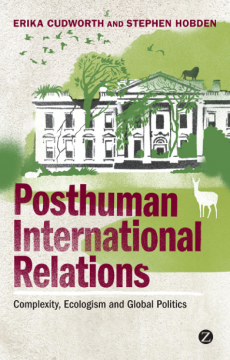
Additional Information
Book Details
Abstract
In this bold intervention, Cudworth and Hobden draw on recent advances in thinking about complexity theory to call for a profound re-envisioning of the study of international relations. As a discipline, IR is wedded to the enlightenment project of overcoming the 'hazards' of nature, and thus remains constrained by its blinkered 'human-centred' approach. Furthermore, as a means of predicting major global-political events and trends, it has failed consistently. Instead, the authors argue, it is essential we develop a much more nuanced and sophisticated analysis of global political systems, taking into account broader environmental circumstances, as well as social relations, economic practices and formations of political power. Essentially, the book reveals how the study of international politics is transformed by the understanding that we have never been exclusively human.
An original work that is sure to provoke heated debate within the discipline, Posthuman International Relations combines insights from complexity theory and ecological thinking to provide a radical new agenda for a progressive, twenty-first century, International Relations.
Erika Cudworth is Senior Lecturer in International Politics and Sociology at the University of East London. Her research interests are in political theory, broadly conceived, particularly feminisms, ecologisms and complexity theory, food consumption and production, human relations with non-human animals and educational inclusions/exclusions. She is author of Environment and Society (Routledge, 2003), Developing Ecofeminist Theory: the Complexity of Difference (Palgrave, 2005), The Modern State: Theories and Ideologies (with Tim Hall and John McGovern, Edinburgh University Press, 2007) and Social Lives with Other Animals: Tales of Sex, Death and Love (Palgrave, 2011).
Stephen Hobden is a Senior Lecturer in International Politics at the University of East London. His main areas of interest are International Relations Theory, China in world politics, and North-South relations. He is the author of International Relations and Historical Sociology: Breaking Down Boundaries (Routledge, 1998), and edited, together with John Hobson, Historical Sociology of International Relations (Cambridge University Press, 2002).
'This is an exceptionally useful dissection of the interplays between complexity, the 'environment' and international politics. Scholars and practitioners in many disciplines/areas will find this illuminating and trenchant'. - John Urry, Distinguished Professor, Department of Sociology, Lancaster University
'This book undertakes an ambitious (yet, peaceful) revolt against the anthropocentric paradigms of IR. Bringing together complexity thinking and posthumanist philosophy, Cudworth and Hobden make a radical assault on the common wisdoms of the study of world politics. They do not merely rethink IR, they reinvent it. This reinvention is complete in the sense that it not only profoundly disrupts the dominant anthropocentric narratives, but also offers new tools for grasping the complex connections and linkages in the international system. Indeed, if IR is to offer any viable responses to current global problems, it needs to realise that humans are 'of', not just 'on', Planet Earth. In this exceptional book, Cudworth and Hobden show how this can be done.' - Emilian Kavalski, University of Western Sydney
'Materialism is making a long overdue comeback in International Relations. This impressive volume will make an important contribution to that. Drawing on developments within complexity theory Cudworth and Hobden have done IR a valuable service in resituating the human in its overdetermined complex socio-material environment. This book will surely be at the forefront of a new materialism in IR.' - Colin Wight, Professor, Government and International Relations, School of Social and Political Sciences, University of Sydney
Table of Contents
| Section Title | Page | Action | Price |
|---|---|---|---|
| About the authors | i | ||
| Acknowledgements | vii | ||
| 1 • Introducing complexity and posthumanism to international politics | 1 | ||
| Complexity theory and the complex world | 4 | ||
| The problem of ‘IR’ | 9 | ||
| The posthuman future of international relations? | 17 | ||
| The structure of the book | 20 | ||
| 2 • Complexity theory in the study of the social world | 25 | ||
| Complexity and the social sciences | 25 | ||
| A typology of complexity approaches | 36 | ||
| Table 2.1 Complexity and social science | 38 | ||
| Conclusion | 50 | ||
| 3 • Complex international systems | 52 | ||
| Systems thinking in international relations | 52 | ||
| Key elements of complex theorizing | 63 | ||
| Complex international systems | 70 | ||
| Conclusions | 79 | ||
| 4 • Emergent features in international systems | 82 | ||
| Emergence and international relations | 82 | ||
| International relations and the global food industry: embedded systems | 97 | ||
| 5 • Complex ecologism | 110 | ||
| International relations, security and the environment | 110 | ||
| Table 5.1 Environment and security | 112 | ||
| Securitization and environmental governance in Europe | 118 | ||
| Complexity, difference and ecopolitical theory | 125 | ||
| Complex ecologism and international relations | 136 | ||
| 6 • The politics of posthumanism | 140 | ||
| More and less critical posthumanisms | 142 | ||
| Reinventing politics | 150 | ||
| Embodied power and posthuman politics | 160 | ||
| A posthuman international relations for earthlings | 166 | ||
| 7 • For a posthuman international relations | 169 | ||
| Implications of posthuman approaches for the study of international relations | 169 | ||
| Why posthuman international relations? | 173 | ||
| The costs of a complexity approach | 178 | ||
| Policy implications – progress in a complex world | 181 | ||
| Future research | 185 | ||
| Bibliography | 189 | ||
| Index | 209 | ||
| About Zed Books | 216 |
